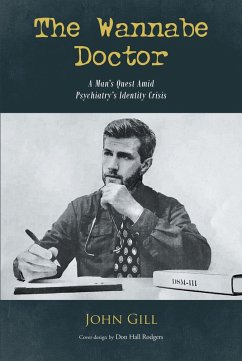
The Wannabe Doctor (eBook, ePUB)
A Man's Quest Amid Psychiatry's Identity Crisis

PAYBACK Punkte
4 °P sammeln!
In the 1970s in the United States, many medical professionals held psychiatry in contempt. An innovative study designed by psychologist David Rosenhan, and published in Science in 1973, provided strong evidence that psychiatrists could not reliably distinguish between normality and mental illness.In early 1974, the American Psychiatric Association "settled" a notable scientific issue by popular vote of its members. As soon as the votes were counted, homosexuality was no longer a psychiatric diagnosis.Critics of psychiatry were asking the APA questions about the profession's core concepts. What...
In the 1970s in the United States, many medical professionals held psychiatry in contempt. An innovative study designed by psychologist David Rosenhan, and published in Science in 1973, provided strong evidence that psychiatrists could not reliably distinguish between normality and mental illness.
In early 1974, the American Psychiatric Association "settled" a notable scientific issue by popular vote of its members. As soon as the votes were counted, homosexuality was no longer a psychiatric diagnosis.
Critics of psychiatry were asking the APA questions about the profession's core concepts. What is the difference between a mental disorder and distress that is a normal occurrence in our lives? What are the causes of mental disorders? The APA's answers were evasive.
The APA decided the best way to improve psychiatry's medical image was to extensively revise its Diagnostic and Statistical Manual of Mental Disorders. The first two editions of the DSM were little used by psychiatrists and were almost unknown to the public.
But DSM-III would be vastly different. To this day, DSM-III significantly affects millions of Americans, often in harmful ways.
The Wannabe Doctor tells how the career of a fictional psychiatrist was affected by psychiatry's desperate claim to be a branch of medicine. Our story also tells how the APA's diagnostic criteria jeopardized the life of one of Dr. Grant Hauser's patients, eighteen-year-old Quentin Holt.
In early 1974, the American Psychiatric Association "settled" a notable scientific issue by popular vote of its members. As soon as the votes were counted, homosexuality was no longer a psychiatric diagnosis.
Critics of psychiatry were asking the APA questions about the profession's core concepts. What is the difference between a mental disorder and distress that is a normal occurrence in our lives? What are the causes of mental disorders? The APA's answers were evasive.
The APA decided the best way to improve psychiatry's medical image was to extensively revise its Diagnostic and Statistical Manual of Mental Disorders. The first two editions of the DSM were little used by psychiatrists and were almost unknown to the public.
But DSM-III would be vastly different. To this day, DSM-III significantly affects millions of Americans, often in harmful ways.
The Wannabe Doctor tells how the career of a fictional psychiatrist was affected by psychiatry's desperate claim to be a branch of medicine. Our story also tells how the APA's diagnostic criteria jeopardized the life of one of Dr. Grant Hauser's patients, eighteen-year-old Quentin Holt.
Dieser Download kann aus rechtlichen Gründen nur mit Rechnungsadresse in A, D ausgeliefert werden.












